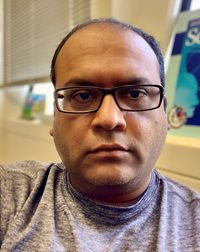A great deal of work goes into the ‘behind the scenes’ of publishing academic papers. Editorial Boards are vital to the process – but who are these editors? What does being an editor involve? And what are the benefits of being an editor?
Editors working on the Society’s 3 journals are based around the world and work in a wide variety of roles. We spoke to 3 of our fantastic editors working on the British Journal of Pharmacology (BJP), the British Journal of Clinical Pharmacology (BJCP), and Pharmacology Research and Perspectives (PR&P), to learn about some of their experiences and motivations.
Hemal Patel
Editor for BJP
|
Hualin Cai
Executive Editor for BJCP
|
Michelle Halls
Reviewing Editor for PR&P
|
 |
 |
.jpg.aspx?lang=en-GB&width=202&height=252) |
Can you introduce yourself and your research?
Hemal Patel: I am Professor and Vice Chair for Research in the Department of Anesthesiology at UCSD and a Research Career Scientist at the VA San Diego Healthcare System. My laboratory is broadly focused on caveolin in health and disease and mainly focused on cardiovascular disease, diabetes, and aging.
Hualin Cai: I work as an assistant professor of clinical pharmacology and as a clinical pharmacist in psychiatry in the Second Xiangya Hospital of Central South University. My research interests primarily focus on biomarker explorations in schizophrenia and other mental illnesses, as well as underlying mechanisms, with the aim to foster current understanding in their pathophysiology and to give further insights to the diagnosis and treatment of them. Another area I am interested in is therapeutic drug monitoring and clinical toxicology of psychotropic drugs, which is more relevant to my clinical assignment.
Michelle Halls: I lead the Spatial Organisation of Signalling lab within the Drug Discovery Biology Theme at the Monash Institute of Pharmaceutical Sciences in Melbourne, Australia. Our research focuses on understanding how G-protein-coupled receptors (GPCRs) control localised signalling, how this can be hijacked by disease, and how we can target these signals to gain greater therapeutic efficacy. By measuring localised signals in live cells my team has shown that signals from GPCRs are dependent on receptor location and can be restricted to tightly regulated subcellular compartments.
What does your position on the journal involve?
Hemal Patel: I have been on the Editorial Board of BJP since 2016 and serve as a handling editor. This position involves evaluating manuscript assignments from the Senior Editorial Board initially for a second opinion on whether they should undergo full review (this involves an initial and subsequent read of the manuscript), and if so, solicit three scientific experts to give their insights into the suitability of the manuscript for publication, evaluate these reviews once received, and ultimately form an opinion to help guide the Senior Editors in deciding whether the manuscript should be further considered and ultimately published.
Hualin Cai: I serve as one of the Executive Editors of BJCP. I arrange for independent reviews of the scientific merit of manuscripts, make a recommendation of the assigned manuscript based on external reviews and may need to adjudicate in the event of differing opinions received from the referees, take action in response to notification and reminder emails, and provide additional comments to Senior Editors when it is necessary and appropriate.
Michelle Halls: I am a Reviewing Editor for PR&P. As part of my editorial role, I am assigned a manuscript by one of the senior Editors, and then I need to find appropriate reviewers for the manuscript based on the field, topic and/or techniques utilised. Once reviews are received, I make a recommendation to the senior Editor as to whether the manuscript should be sent back to the authors to undertake revisions or whether it should be rejected at this point. After a manuscript has been resubmitted, and the reviewers have assessed the authors response to their queries, I again make a recommendation to the Senior Editors as to whether the manuscript should be accepted.
In addition, I often receive requests to review manuscripts from other Editors.
What’s your favourite part of the role?
Hemal Patel: My favourite part of the process is reading the manuscript reviews that come in from world experts on the topic and learning from their insight. This helps me to learn, become better informed about making a fair decision, and appreciate the novelty and potential impact of a study for the scientific community. I have also enjoyed meeting and getting to know many others involved in the process over the years, which reinforces the idea that science is truly a community.
Hualin Cai: When I was still a student, in my imagination, to be an editor in the office seems to be dull and boring. However, after I have really gotten a chance to participate, the last thing I ever feel is bored. As a scientist, the most exciting thing I would like to do is to explore new areas and expand my horizons. The favourite part of my role as an Executive Editor is that I can read many interesting manuscripts first hand with new ideas, conceptual frameworks or new methods submitted to the journal. During the processing of handling, I will also do a literature survey about the topic of the manuscript, which gives me the chance to absorb new knowledge and enhance my skills.
Michelle Halls: I love seeing a broad view of the different types of research that are ongoing in pharmacology. This role gives me an opportunity to read manuscripts and papers that are not in my field and that I wouldn’t usually see in the course of my day-to-day research.
What skills do you think are most important for an Editor? Who would make a good Editor?
Hemal Patel: As an editor, you need the ability to critically read the scientific literature and evaluate the rigor of the results. You need to have expertise in specific disciplines but also broad interests, as this helps you to identify important studies. One of the most important skills an editor can have is the ability to choose appropriate colleagues to evaluate the science.
Ultimately, an ideal editor would be someone who is committed to advancing scholarship in their particular field and can carve out dedicated time in their academic schedule to shepherd manuscripts down a long, methodological, and important review and publication process. The limit is not necessarily an individual's years of experience (as editing, though a steep learning curve, teaches individuals to improve their skill set) but their desire and commitment to the process and learning from it.
Hualin Cai: The most important skill, in my opinion, is how to identify suitable reviewers and make unbiased recommendations. Suitable reviewers usually will make pertinent comments, which could significantly facilitate decision making for an Editor. To be a good Editor, one must also have extensive professional knowledge, meticulous and diligent work attitude, and a keen sense of smell for the hot topics and future trends in which the journal readership is interested. Last but not least, a good Editor should have a great enthusiasm in scientific editing and other editorial work.
Michelle Halls: I think being organised is very important, as it is important to keep track of assigned manuscripts and reviewer invitations so that the authors are given a fair decision as soon as is possible. It is also important to have a fairly broad knowledge of the subject area so that you can make informed decisions regarding the manuscript and its reviews. I think it’s also just as important to know people with different scientific expertise who you can invite to review a manuscript that, for example, may use a technique you are not an expert in yourself.
What have you learnt from working on the journal?
Hemal Patel: I have learned to manage the handling of manuscripts more efficiently. At first, this can be a daunting task, but it gets easier and more enjoyable with practice. In this process, I have learned to ’listen’ better to expert reviewers and, in some instances, to reassess opinions I may have initially formed in reading a manuscript. I have been able to apply these lessons and hopefully improved the process of getting important and valuable research to the scientific community.
Hualin Cai: I am so happy to work on BJCP. I have learnt a lot and am still learning from such wonderful experiences, which are about connecting, communicating, collaborating and creating together. In this team, Editors from all over the world are connected efficiently through an international network. We always communicate before bringing up new and constructive ideas. During communication, young Editors will rapidly grow and benefit from collaborating with experienced senior Editors. In the process of collaboration, sparks of wisdom collide among the members of editorial team and the goals are creatively accomplished.
Michelle Halls: I have learnt what is really helpful from an Editor’s perspective to see in a review, and I hope I have updated my own reviewer style to incorporate this. Seeing the different ways that papers are put together, and how to communicate more effectively, is also useful when writing my own research manuscripts.
Comments
If you are a British Pharmacological Society member, please
sign in to post comments.